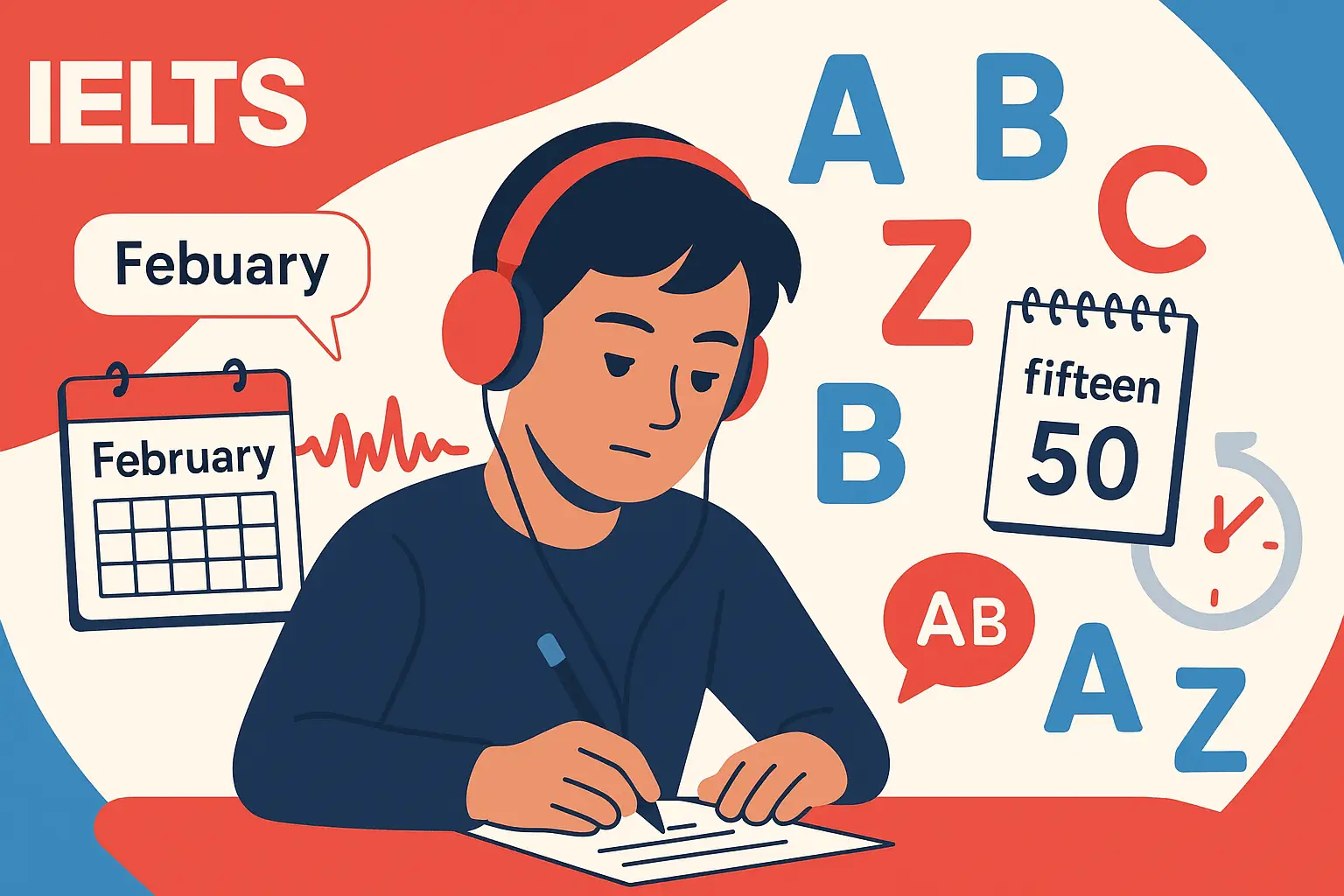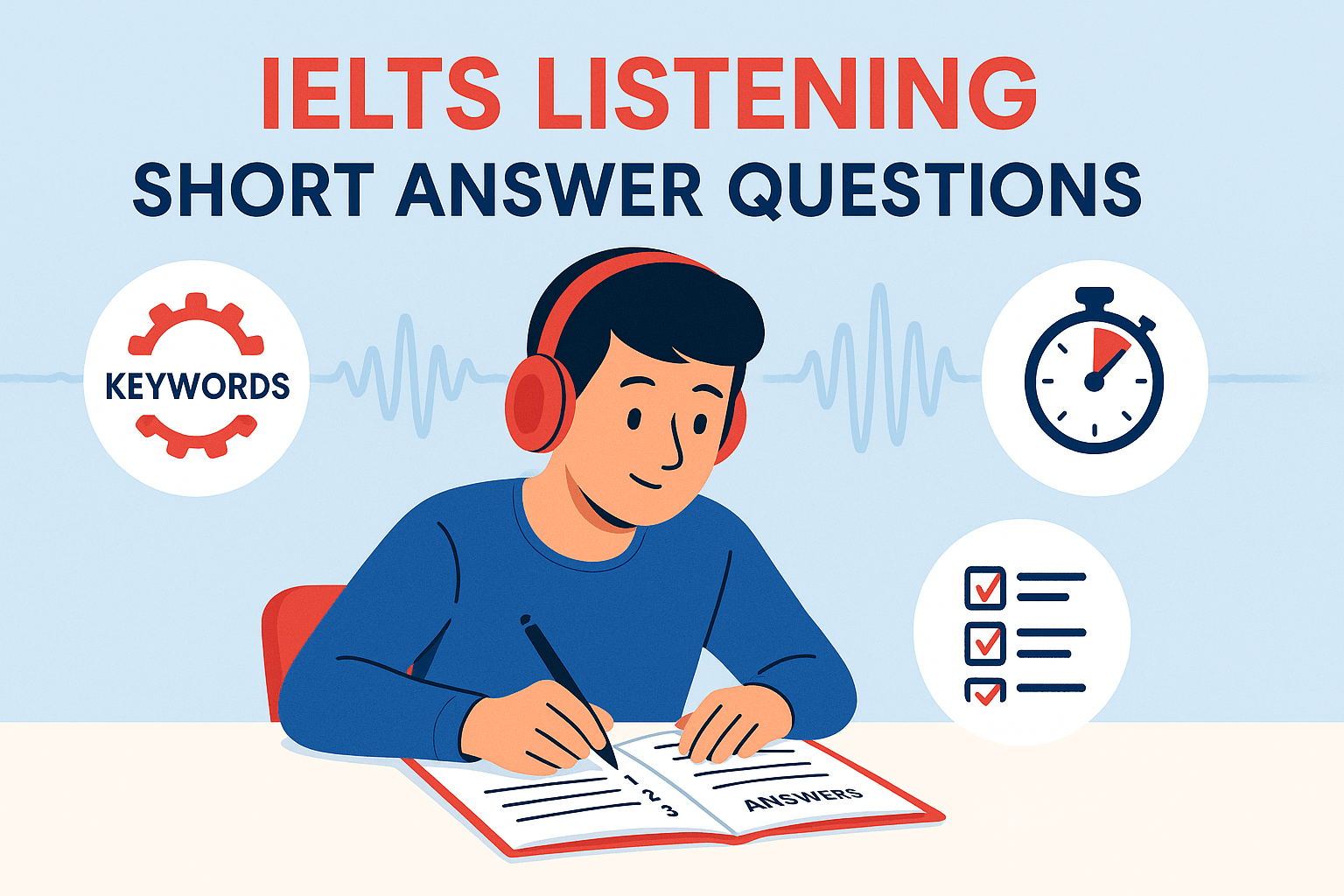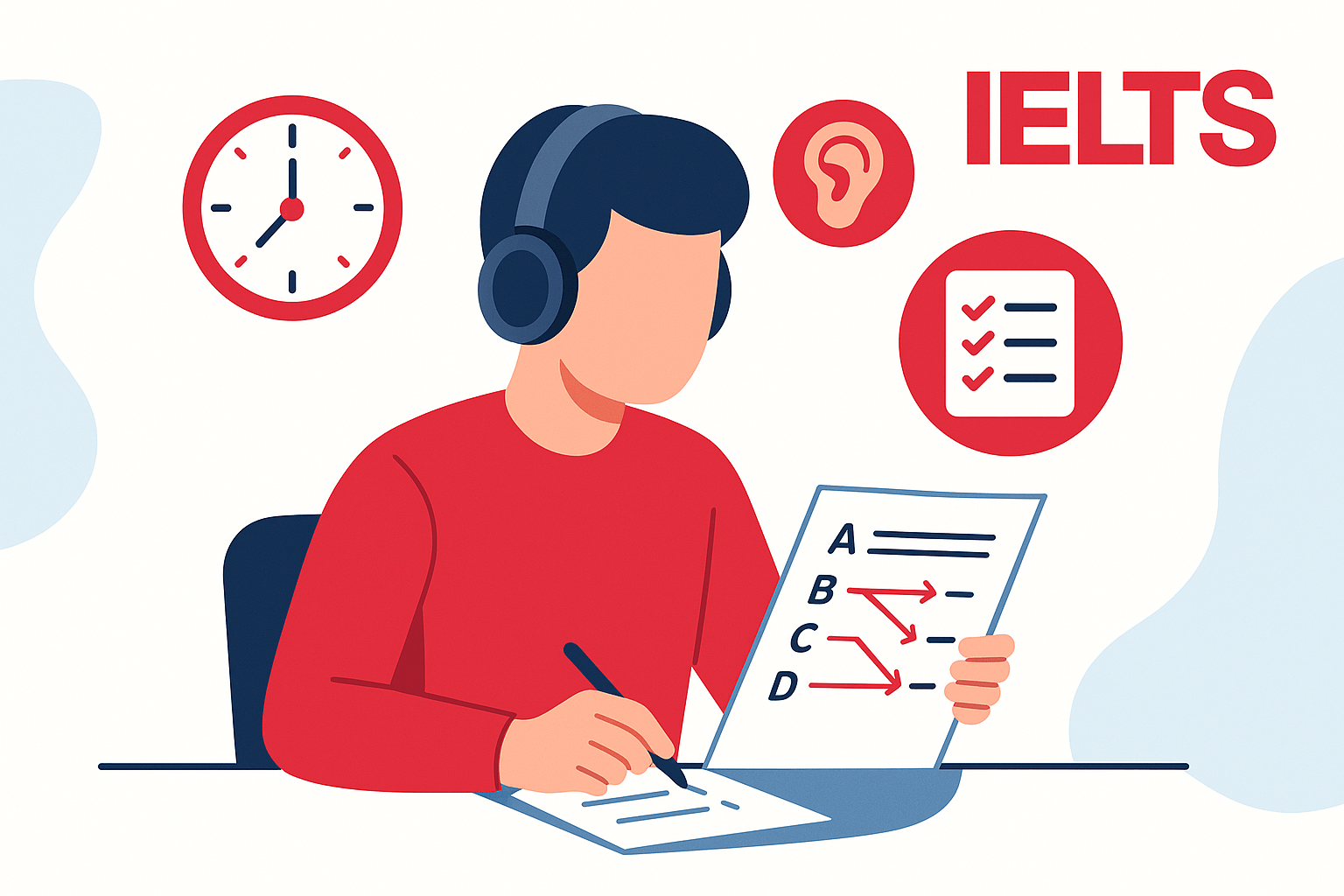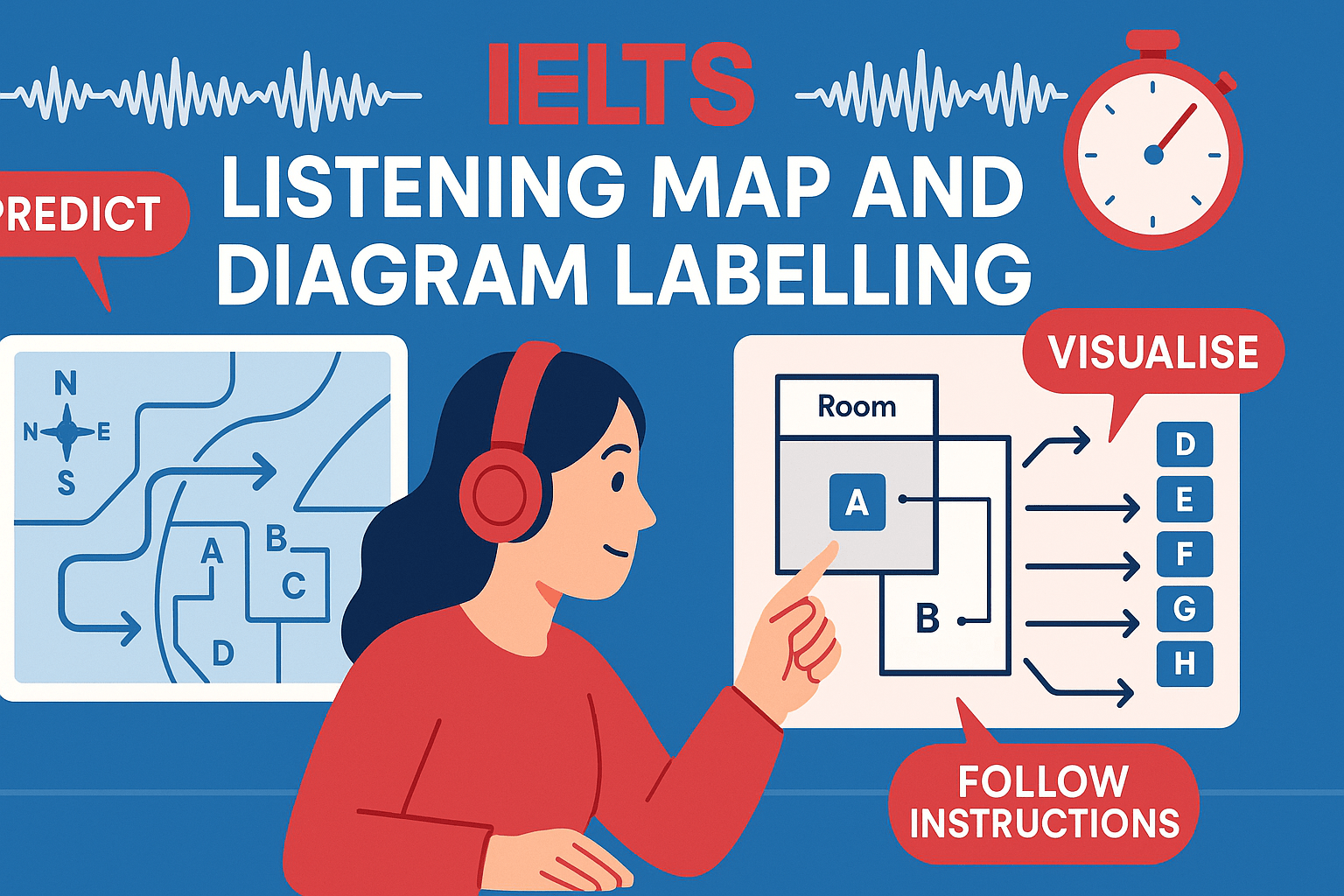- Why Spelling, Numbers, and Dates Matter So Much
- Spelling Errors That Cost Marks
- Getting Numbers Right in IELTS Listening
- The Problem with Dates: 9/10 or 10/9?
- Real Student Scenarios: What I’ve Learned
- Boosting Your Listening Accuracy with Vocabulary Practice
- Want Band 7–9? Here’s Your Full Listening Guide
- Frequently Asked Questions (FAQ)
When it comes to IELTS Listening, I’ve seen far too many bright students lose valuable marks—not because they didn’t understand the audio, but because they got spelling, numbers, and dates wrong. These are the simplest yet most unforgiving parts of the test. As an international IELTS teacher, I work with learners from across the globe, and trust me—these tiny errors can be the difference between a Band 6.5 and a Band 7 or higher.
In this post, I’ll walk you through the most common mistakes and how you can avoid them to boost your IELTS Listening score. Let’s dive in.
Why Spelling, Numbers, and Dates Matter So Much
Many students assume that understanding the content is enough—but IELTS is a test of both listening and accuracy. If you spell “February” as “Febuary” or write “50” instead of “15,” you will lose the mark. There’s no partial credit here.
And it’s not just my students in Asia or Latin America—I’ve seen native speakers make these mistakes too. The Listening test isn’t just about what you hear; it’s about what you write down correctly.
Spelling Errors That Cost Marks
Here are a few examples I’ve seen in real practice sessions:
- ❌ Febuary instead of ✅ February
- ❌ Enlish instead of ✅ English
- ❌ Adress instead of ✅ Address
One of my students in Spain kept writing “licence” as “license,” which is correct in American English but not in British English—the version used in the IELTS test.
Tip: Always revise your British spelling rules. Refer to official resources like ielts.org and takeielts.britishcouncil.org to stay updated.
Getting Numbers Right in IELTS Listening
Here’s a common trap: The speaker says “fifty”, and students write 15—or vice versa.
It gets trickier with phone numbers, postcodes, or prices. One of my students in Bangladesh lost two marks for writing $150.00 instead of $15.00 just because he missed the word “fifteen”.
Common Confusions:
- 13 vs. 30
- 14 vs. 40
- 17 vs. 70
Solution: Practice dictations and say the numbers aloud as you write them down. It helps reinforce accuracy under exam conditions.
The Problem with Dates: 9/10 or 10/9?
Dates are one of the biggest areas of confusion because the UK and other countries use different formats. For example:
- 9/10 in UK = 9th October
- 9/10 in US = 10th September
In IELTS, always follow the British date format (day/month/year) unless told otherwise. One student from Brazil once told me she was marked wrong for writing the US format, even though her answer was numerically correct.
Also watch out for:
- Hyphens: twenty-fourth vs. 24th
- Spelling: January (not Janury)
Practice writing full dates like:
- 12 October 2022
- 14th of July
- Monday, 3 April
These formats are all acceptable, but be consistent and check what the instructions ask.
Real Student Scenarios: What I’ve Learned
One of my students in Egypt was a strong listener but consistently scored 6.5 because she mixed up “eighteen” and “eighty”. We worked together using audio drills from our IELTS premium courses and focused on pronunciation patterns. After two weeks, she hit Band 7.5.
Another learner in Poland forgot to add “s” at the end of plural words, like “dates” or “figures,” which are sometimes required. Always remember: Grammar accuracy matters in IELTS Listening.
Boosting Your Listening Accuracy with Vocabulary Practice
To improve spelling, numbers, and dates, your vocabulary base must be strong. That’s why I always recommend integrating active vocabulary learning into Listening prep.
You can check out my full IELTS Listening Vocabulary & Practice Guide to learn how to study the most common vocabulary types, especially those related to time, prices, addresses, and academic terms.
Want Band 7–9? Here’s Your Full Listening Guide
If your goal is a Band 7 or higher, you can’t afford to miss marks on small details. Make sure you’ve read my comprehensive IELTS Listening Band 7–9 Guide, where I break down skills, strategies, and exam-day routines that actually work.
Frequently Asked Questions (FAQ)
Q1: Can I use American spelling in the IELTS Listening test?
A: No. IELTS uses British English conventions, so always follow British spelling rules. “Colour” and “centre” are correct—not “color” or “center”.
Q2: Will I lose marks for using the wrong date format?
A: Yes. If the format is incorrect or unclear (e.g., mixing US and UK date styles), your answer may be marked wrong. Stick with the British format: day/month/year.
Q3: Are capital letters required for spelling answers?
A: You can write all answers in uppercase, which avoids confusion. However, if using lowercase, make sure names, months, and other proper nouns are capitalised correctly.
Q4: What’s the best way to practise numbers and spelling?
A: Use audio-based drills, online dictations, and timed transcription exercises. Focus especially on confusing number pairs like 13/30, 14/40, etc.
Q5: Where can I take official IELTS practice tests?
A: Try trusted resources like ielts.idp.com or British Council’s official site. For in-depth practice, explore our IELTS courses on Course Line.
Final Note: Spelling, numbers, and dates may seem basic, but they’re often the silent score-killers in IELTS Listening. With focused practice and strategic attention to detail, you can avoid these pitfalls—and get the score you deserve.
Let’s get to Band 8+—one correctly spelled word at a time.





